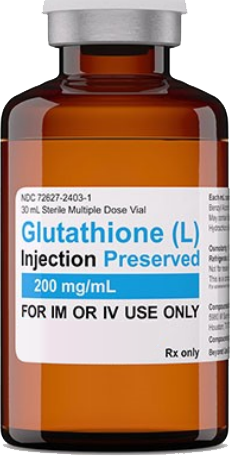Benefits Of Glutathione
Everything from the food we eat, the clothes we wear, even the air we breathe has our bodies working overtime to fight off damage and replenish our cells. To further the problem, as we age our glutathione levels fall. Glutathione is a substance produced naturally by the liver. It is also found in fruits, vegetables, and meats. Our world is filled with toxins. This makes our bodies extremely susceptible to breakdown and disease. In fact, the average 45-year-old has already experienced a 50% decrease in glutathione. Here’s what Glutathione is known for:
- Increases Energy: When you increase the amount of cellular Glutathione in your body, you are giving yourself a health-promoting energy boost, eliminating toxins, and empowering your immune system. When Glutathione levels are low, it’s generally a good indicator that cellular energy is low, too. Therefore, low levels of Glutathione will often correlate with low energy levels
- Protects Against Liver Damage: Increasing Glutathione provides long term liver protection and health benefits. Your liver has one of the highest concentrations of Glutathione in the body. Every time your liver is exposed to excess chemicals, pollutants, or toxins, your liver concentrations of Glutathione drops considerably. Several studies have shown that Glutathione administration helps to recover oxidative stress-induced liver damage in alcoholic and non-alcoholic liver diseases
- Boosts Immune Function: Glutathione is the most important molecule you need to stay healthy and prevent disease. Glutathione is critical in helping your immune system do its job of fighting infections. Studies show that Glutathione can help in the treatment of AIDS and even help to prevent cancer.
- Controls Cell Death: Glutathione is essential for cell survival and its depletion increases the cellular susceptibility to Cell Death. High intracellular Glutathione levels help cells live healthier and longer, and low intracellular levels have been shown either to induce or increase cell death
- Increase Metabolic Efficiency: Researchers at Baylor School of Medicine found that Glutathione plays a critical role in weight management and insulin resistance as we age. The older we are the less Glutathione our bodies produce. Study findings indicated that low Glutathione levels were associated with less fat burning and higher rates of fat-storing in the body
- It’s Naturally Present in every human cell
- Helps maintain good physical health
- Improves physiological functions
- It’s one of the most Important Antioxidants in the human body
- Used for preventing poisonous side effects of cancer treatment (chemotherapy) and for treating the inability to father a child (male infertility).
- Many people find that using Glutathione for skin lightening, reducing the appearance of their scars, whether from acne or a minor injury. It is also known to brighten the skin while evening the user’s skin tone by fading dark spots and age spots.
Mechanism of Action
Glutathione is an essential molecule required for detoxification. Glutathione acts by assisting the body’s machinery in the removal of harmful destructive oxygen containing molecules. During the body’s normal functioning an excess of oxygen containing molecules are produced, these molecules are typically very reactive with other molecules they come in contact with. In modern biochemistry these are referred to as reactive O2 species.
Reactive O2 species molecules include peroxide (H2O2) and superoxide anions (O2 with unpaired electron) these molecules are very toxic to the cell. The toxicity can be explained by the tendency of these molecules to bind or destroy important biomolecules. The body has a natural system to remove these reactive O2 species. These systems metabolize and scavenge for reactive oxygen species, in a controlled and precise fashion.
The system that removes these toxic reactive oxygen species includes a host of enzymes: Glutathione peroxidase (GPX): GPX detoxifies peroxides with Glutathione acting as an electron donor in the reduction reaction, producing glutathione disulfide as an end product. GPX is a 80 kDa protein that is composed of four identical subunits. It is expressed throughout the entire body, individual isoforms are present in specific tissues. When the body is in a state of excess oxidative stress the expression of this enzyme is induced.
Abnormal expression has been associated with a wide variety of pathologies, including hepatitis, HIV, and a wide variety of cancers, including skin, kidney, bowel, and breast. Glutathione reductase (GR)- catalyzes reduction of glutathione disulfide is by requires NADPH producing two Glutathione molecules as an end product. GR is a member of the flavoprotein disulfide oxidoreductase family and exists as a dimer. Expression of GR is upregulated during periods of increased oxidative stress, to prepare for reactive oxygen species removal. The level at which regulation takes place is at the transcriptional level as well as
at the post translational level. Down regulation of GR production and activity are thought to be associated with cancer and aging.
- Catalase: is involved in detoxification of reactive oxygen species.
- Superoxide dismutase (SOD): is involved in the removal of superoxide species.
Immune Function: Glutathione plays a significant role in immune function. It encourages the T-cell function that’s essential
for a healthy immune system and protects from environmental toxins. Additionally, glutathione is essential in a broad range
of metabolic processes:
- Glutathione acts to neutralize a toxic metabolic byproduct: Methylglyoxal
- Glutathione is involved in the protein disulfide bond rearrangement that is necessary for the synthesis of one third of the
body’s proteins
- The liver uses Glutathione to help detoxify fats before the gallbladder emits bile, supporting healthy digestion Detoxifica-
tion: Glutathione may also be crucial in the removal and detoxification of carcinogens, and according to recent stud-
ies alterations in this metabolic pathway, can influence cell survival profoundly. Glutathione may be responsible for several vital roles within a cell besides antioxidation:
- Maintenance of the redox state (chemical reactions in which the oxidation state of atoms are modified)
- Modulation of the immune response
- Detoxification of foreign bacteria and viruses
Chronic Disease: Research has demonstrated that Glutathione deficiency may be a factor in many chronic conditions; HIV/AIDS, Alzheimer’s, Parkinson’s disease, asthma, different cancers, cataracts, macular degeneration, open angle glaucoma,
diabetes, and many diseases of the liver, kidneys, lungs, and digestive system.
Depletion Due to Aging and Alcohol Consumption: Glutathione plays a major role in the detoxification of ethanol (consumed as alcoholic beverages) and people who routinely drink will experience Glutathione depletion. Aging is another factor; as the body ages Glutathione levels may drop below the level necessary to maintain healthy immune function (among other
processes).
Depletion of Glutathione may also Caused by Other Factors: Besides alcohol consumption and the aging process, there are other factors that can deplete levels of Glutathione:
- Acetaminophen
- Aspartame
- Benzopyrenes (tobacco smoke, fuel exhaust, etc.)
- Many household chemicals (detergents, fabric softeners, air fresheners, mothballs, cleaners, bleach, etc.)
Fertility: In a study of eleven infertile men, suffering from dyspermia associated with various andrological pathologies – Glutathione was observed to exert a significant effect on sperm motility. Glutathione appeared to have an observable therapeutic effect on certain andrological pathologies that cause male infertility.
Atherosclerosis: In one study, ten patients with atherosclerosis were administered Glutathione which resulted in a significant increase in blood filtration, in addition to a significant decrease in blood viscosity and platelet aggregation. Consequently, Glutathione infusion was determined to be an effective method of decreasing blood viscosity while increasing blood filtration.
Dermatological Properties: In a three-month study of female subjects, the women taking Glutathione showed significantly improved skin elasticity and amelioration of wrinkles compared to test subjects who received a placebo.
Storage
Store this medication in a refrigerator at 36°F to 46°F (2°C to 8°C). Keep all medicines out of the reach of children. Throw
away any unused medicine after the beyond use date. Do not flush unused medications or pour down a sink or drain.


